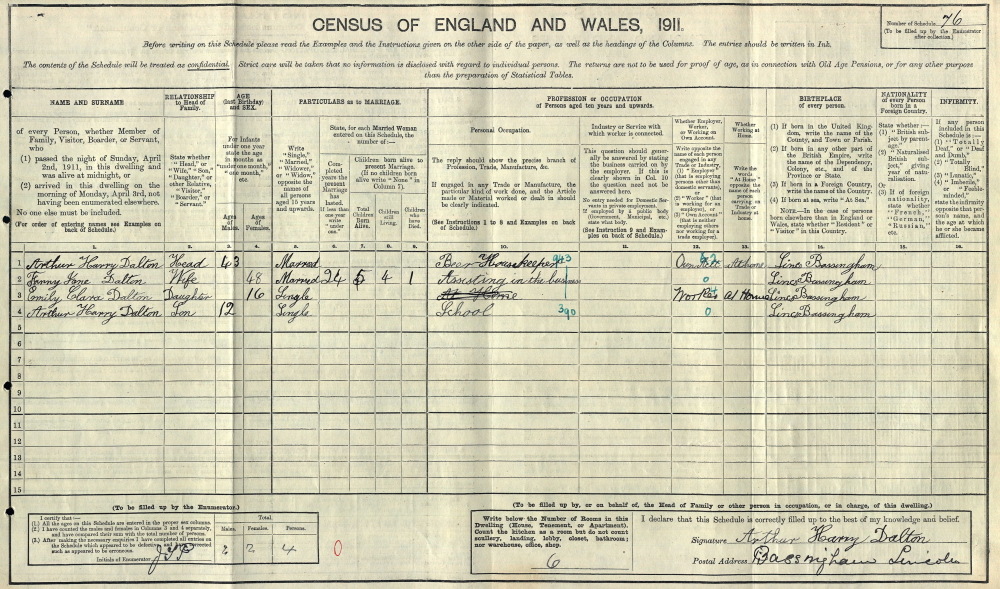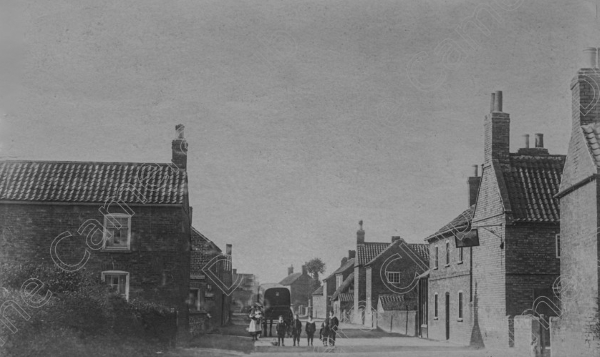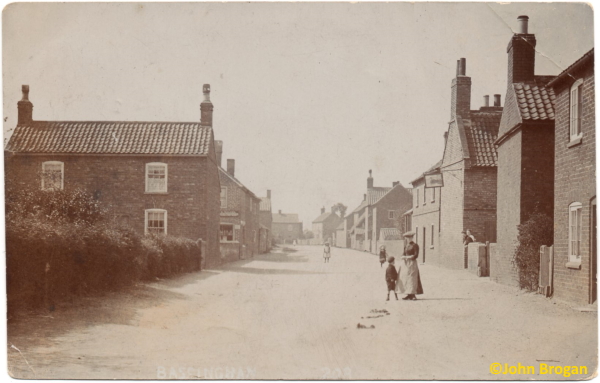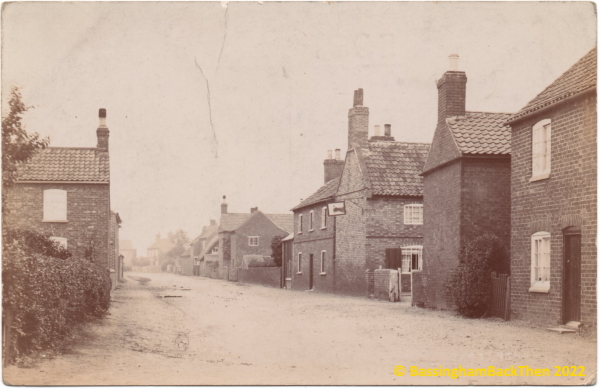Question: When is a ‘pub’ not a ‘pub’?
Answer: When it’s a ‘beerhouse’!
Now it will almost certainly come as a surprise to long-time residents of the village to learn that, technically, the village has only ever had two ‘pubs’. The “Five Bells” and “The Bugle Horn” were each regularly recorded as being a ‘Public House’ in the various Histories, Directories and Gazetteers of the day, whereas “The Black Swan” on Water Lane never seems to have been accorded that distinction, being referred to instead as a ‘Beer-house‘. My investigations bring me to the conclusion that “The Mucky Duck”, as it was known locally, was licensed to sell only beer, and not spirits, hence the distinction. To back this up, in the vast majority of cases, those same Directories and Gazetteers recorded the landlord/licensee as either a “beer seller” or the keeper of a “beer house”; only in the 1881 census was he ever listed as a “publican”. In fact we also have to wait until that same census for the first reference to “The Black Swan” as a premises/outlet.
The first mention of anything resembling a “beer-keeper/seller” on Water Lane comes with Aubourn-born Robert Dalton, a “beer retailer” mentioned in the 1849 Post Office Directory. Dalton had married Ann Taylor at Aubourn in May 1830, the couple subsequently moving to Bassingham, so that by the time of the 1841 census he was recorded simply as a “baker” residing on Water Lane. By 1849 he had clearly expanded his business to include the retailing of beer although there is no indication as to his premises so “The Black Swan” would be a guess, albeit an educated one. Strangely the 1851 census makes no reference to the beer business as it records Dalton as a “Farmer & Freeholder 13 acres”. The beer-house reference returns in the 1855 Post Office Directory and again in White’s Directory of Lincolnshire of 1856, but we have to wait until 1861 for the first mention in a census where we find Robert Dalton aged 63 recorded as a “Beer-seller” on Water Lane. He’s still there in Morris’ Directory of 1863 but by the time of the 1868 Post Office Directory he had been superseded by his son, Robert Dalton Jnr.
In the 1871 census Dalton Snr. was now a retired farmer, and he died in January 1873, by which time Dalton Jnr. was farming again. Bob Dalton had actually been replaced by 40-years-old Samuel Hardington from Malton, North Yorkshire. The entry for his occupation reads “Beer House & General Dealer”, and then in White’s History, Gazetteer & Directory of Lincolnshire for 1872 Hardington’s entry reads “baker and flour dealer, beerhouse”.
By the time of the 1876 edition of Kelly’s Directory, the bakery business seems to have gone as we find Henry Smith Ford to be the resident “beer retailer” now. The 1881 census is the first occasion that the name “The Black Swan” is mentioned and Ford is recorded as a “publican”. At this time Ford was a 46-years-old from Norton Malreward, Somerset, and his wife Caroline (37) hailed from Box, Wiltshire. They had three children: Emily (aged 10, born Bath); George Alfred (3, born Bassingham); Fanny Maria (2, also born in Bassingham), so he probably took charge of the premises somewhere around 1878. (As an aside, the enumerator for this census of the village was renowned surgeon and local GP, Osborne Johnson, whose family lived in “Ivy House” for many years, all the way up until 1982 when the last Johnson departed the village.)
Ford was still there in the 1882 White’s Directory, and the 1885 and 1889 editions of Kelly, albeit with no reference to “The Black Swan”. The 1891 census (carried out by John Hammond of Hammond Hall fame) lists Ford as a “publican” once more and his premises are named. Daughter Emily had left (or died) and they had another child, 7-years-old Henry William, born in the village (obviously!) The premises were also home to a few lodgers, namely: William Nokes (50, a blacksmith from Reading); James Jones Brades (?) (45, another blacksmith, from Chester); Jane Ester Robinson (65, a widow and “hawker”, birthplace unknown); William Lunn (61, farm labourer from Norton Disney).
The 1892 edition of Kelly cites Ford as a “beer retailer & brewer” (no mention of premises – these directories are consistent!) but the 1896 edition signals the end of Ford’s tenure; instead we encounter the name of Robert William Heslem [sic – should be Heslam] for the first time. He wasn’t there long because by the Kelly’s Directory of 1900 it looks like his son, William Rogers Heslem [sic], was running the show. The 1901 census records Heslam as an “innkeeper” living on Water Lane but the document but makes no reference to “The Black Swan” as his premises. He was 51 years old and came from just up the road in Thurlby; his wife, Eleanor, was 46 and from Boultham, Lincs. The couple had produced children but they had flown the nest by this time and they were alone in the building. He was still the village “beer retailer” in 1905 according to Kelly and again in 1909 but by the time of the 1911 census William had remarried – Eleanor having died in the December quarter of 1907 – and was now a village farmer. Also of note in that census – written in his own hand – we see confirmation that the correct spelling of the family surname was indeed Heslam, not Heslem.
That 1911 census reveals the name of Arthur Harry Dalton as the new “Beer Housekeeper” in the village. Dalton was 43 years old and born in the village, which suggests that he was “coming home” – he was almost certainly related to the Daltons who ran the place back in the middle of the 19th century. His wife, Fanny Jane, 48 and also Bassingham-born, was “assisting in the business” probably as a barmaid. Their children were 16-years-old Emily Clara, and Arthur Harry Jnr. aged 12. Young Arthur was at school, whilst Emily was listed as working “at home” so she was either cleaning the house or helping out in the bar, possibly clearing up. The 1911 census was completed by the occupant, so we can be sure that this is Dalton’s own handwriting. An extra piece of information from around this time is that according to ‘The “Revolt of the Field” in Lincolnshire’ (R.C. Russell, 1956) the defunct Lincolnshire Agricultural Workers Union was reformed in “The Black Swan” in 1914.
An extra piece of information from around this time is that according to ‘The “Revolt of the Field” in Lincolnshire’ (R.C. Russell, 1956) the defunct Lincolnshire Agricultural Workers Union was reformed in “The Black Swan” in 1914.
The Kelly’s Directories of 1913 and 1919 show that the Daltons were still there and again into 1926. but that is the last source to record them. That is, until 1933 when an Albert Dalton turns up – as licensee of “The Bugle Horn”! Surely they have to be related?
Anyway, back at “The Black Swan”… the 1930 Kelly’s Directory of Lincolnshire lists Frank Bates as the “beer retailer” but as I have no access to any census materials around this time I cannot shed any light on either Bates himself or his family. He’s still there in the 1933 edition too.
Walter Brooke ran the business by 1937, soon followed by George William Turner in the 1939 Register. Confusingly, although the address is clearly written as “The Black Swan”, Turner is listed as a “Brewer’s labourer heavy worker”. Born 6th October 1904 he lived there with his wife, Muriel Amy Turner, born 20th January 1913 and one other person whose record is currently redacted (“officially closed”). I cannot find anyone whose occupation comes close to “beer housekeeper” or such like on Water Lane, so he simply has to be our man.
The last person to work there was a Mr. Burke, with “The Black Swan” finally being “decommissioned” to become a private dwelling in 1974 although to this day it still proudly displays the sign of a black swan on the front wall. If you are ever invited inside you will still be able to see the remains of Bob Dalton’s bread ovens, and there are large sections of quernstone in the garden.
And if you can fill in any gaps with regard to the landlords then please get in touch.
The postcards below show “The Black Swan” at the right edge; you can recognise it by the sign hanging off it into the road just below the row of double bricks in the gable end. This top one is possibly the earliest of the lot and is © Dunholme Camera Club.
This top one is possibly the earliest of the lot and is © Dunholme Camera Club. The above postcard was dated 15th October 1911 and was written from “Southfield” by Edgar Pilgrim to his London-based mother, and reads, ”Dear Mother, I hope you are as well as I am. I know you are not having as good a time as I am. This is a photo of Mr Doulton’s public house, and is for Emmie. I am still yours, and always will be. The feast is at Bassingham. I love you as much as this xxx etc. I am still yours, Edgar xxx etc.” As I have pointed out above, Arthur Harry Dalton (not Doulton) was the “Beer Housekeeper” at this time.
The above postcard was dated 15th October 1911 and was written from “Southfield” by Edgar Pilgrim to his London-based mother, and reads, ”Dear Mother, I hope you are as well as I am. I know you are not having as good a time as I am. This is a photo of Mr Doulton’s public house, and is for Emmie. I am still yours, and always will be. The feast is at Bassingham. I love you as much as this xxx etc. I am still yours, Edgar xxx etc.” As I have pointed out above, Arthur Harry Dalton (not Doulton) was the “Beer Housekeeper” at this time. Although this postcard has a message written on the back it was never sent and is not dated although I believe it to be 1908.
Although this postcard has a message written on the back it was never sent and is not dated although I believe it to be 1908.
And here’s a fabulous photograph of “The Black Swan” in 1969 © Historic England.  From the same series by Historic England comes the next photograph which has been identified as two long-demolished buildings which once stood in the yard of “The Black Swan”. Alan Taylor, who lived in “The Mucky Duck” between the ages of four and nine, recalls that he regularly played in rooms of one of the buildings and often used the toilet in the other! James Butler adds that where the Barfords van is parked there used to be a pig-sty.
From the same series by Historic England comes the next photograph which has been identified as two long-demolished buildings which once stood in the yard of “The Black Swan”. Alan Taylor, who lived in “The Mucky Duck” between the ages of four and nine, recalls that he regularly played in rooms of one of the buildings and often used the toilet in the other! James Butler adds that where the Barfords van is parked there used to be a pig-sty.
And, while we’re on the subject of beer-houses…
“The Four Horseshoes” / “The Brandt”
There was a second beer-house… Wilson and Ash tell us in The Bassingham Story (2003) that “this one [was] associated with the Walton family. It stood near the Brant at a site on the Broughton Road that was just into Navenby parish. John Walton is first mentioned as a ‘beer retailer’ in the 1855 Post Office Directory, and last occurs as “farmer and beerhouse, The Brandt” in White’s 1872 Directory. Only one census seems to pick him up, the 1861, which lists him as “Publican & Farm of 23 Acres”, aged 43, of Carlton Scroop. His wife Eliza, aged 28, was from Nettleham, and there were six children. Also there were his mother Elizabeth, a 78-years-old widow, and [his] wife’s sister, Sarah Morris – only a scholar aged 8. Lodging [with them] was an Agricultural Labourer, Joseph Hutchinson, aged 65. The ‘Four Horseshoes Crossroads’ on the Broughton Road preserves the name.”
Unfortunately I have no photographs of it.

 BACK HOME
BACK HOME